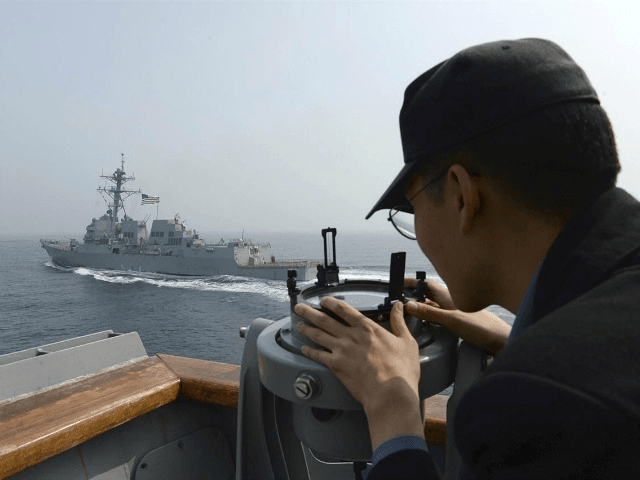Japan’s annual defense report is focused on the threat from North Korea, but it also has a good deal to say about China.
Those two Japanese concerns converged in a live-fire exercise held by the Chinese Navy off the Korean coast this week, in which dozens of different types of missiles were tested, air intercepts were simulated, ground assaults were practiced, and submarines prowled the waters.
Japan’s report cited the growing number of fighters scrambled to intercept Chinese aircraft probing Japanese airspace, warning that Chinese naval and air activity may “pick up pace in the Sea of Japan from now on.”
Japanese analysts said China “continues to display what may be described as a heavy-handed attitude, including its attempts to alter the status quo by force” in the South and East China Seas, where Japan and China are embroiled in territorial disputes.
“China’s activity in the South China Sea is a threat not only to Japan but to the international community. We recognize its calls for the preservation of maritime freedom that is based on the law are of great importance, and the Defense Ministry will continue to cooperate closely with the international community in dealing with this problem,” Defense Minister Itsunori Onodera said on Tuesday, as quoted by Japan Times.
The Japan Times notes this is the first Japanese defense report that emphasizes the benefits of hosting American military bases for both Japan and America, with an eye towards both the Chinese and North Korean threats. These comments were taken as a rebuke to President Donald Trump’s criticism of Japan for not shouldering enough of its defense burden.
Reuters carried China’s contemptuous response to the Japanese report on Tuesday, quoting Chinese Foreign Minister Wang Yi’s accusation that Japan is “playing the same old tune” by warning of Chinese aggression.
The Chinese Foreign Ministry backed Wang up by claiming the Japanese analysis is “full of untruths” in an effort to “blacken China’s name to deceive the international community,” as Reuters put it.
China’s naval drill off the Korean peninsula concluded on Tuesday after four days of test-launching just about everything in their inventory, a fireworks display so huge that the People’s Liberation Army Navy felt obliged to cordon off 15,000 square miles of the East China Sea. It was attended by a number of top Chinese military officials, including naval commander Vice Admiral Shen Jinlong.
Everyone seems to agree that China used the drill to send a message, but analysts differ on who the message was intended for. Malcolm Davis of the Australian Strategic Policy Institute hopefully told the South China Morning Post that China “could be sending a message to the North Koreans that they will be effective in any conflict if war is to break out.”
On the other hand, Collin Koh of Singapore’s Nanyang Technological University is quoted in the same piece saying “various players on the Korean peninsula” were meant to take note of China’s naval power, not just North Korea.
Another SCMP report filed at the beginning of the Chinese naval drill quoted Euan Graham, director of the Lowy Institute’s international security program, speculated that China is primarily interested in protecting North Korea’s interests by sending an intimidating message to the United States.
“The so-called honeymoon period is now over, and the two sides are moving towards a more conflictual relationship that’s playing out in several domains and several geographic areas, and the Yellow Sea is—no surprise—one of them,” said Graham.
Chinese President Xi Jinping certainly did not sound concerned about North Korea when he addressed his troops after a ground exercise in Inner Mongolia a few weeks ago. Instead, he told Chinese soldiers to be ready for battle if other nations force China to “swallow the bitter fruit that is harmful to our sovereignty, security, or development interests.”
“We will never allow any people, organization, or political party to split any part of Chinese territory out of the country at any time, in any form,” said Xi. “The Chinese people love peace. We will never seek aggression or expansion, but we have the confidence to defeat all invasions.”
Such remarks are generally interpreted as warnings to nations, such as Japan, which challenge Chinese territorial claims in the South and East China Seas. China claims that nearly all of the islands and reefs in both bodies have been its rightful property since ancient times.
The United States and South Korea are scheduled to conduct a joint training exercise called Ulchi-Freedom Guardian in August, a massive annual drill that is routinely criticized by North Korea as either practice for an invasion of its territory, or an actual invasion that will be launched under the cover of mere military exercises. Suspending all such exercises is a demand both North Korea and China have made of the United States.

COMMENTS
Please let us know if you're having issues with commenting.